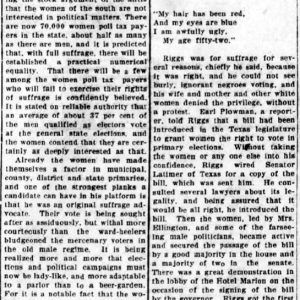calsfoundation@cals.org
Alice Sankey Ellington (1880–1970)
Alice Sankey Ellington was a leader in the women’s suffrage movement in Arkansas, an officer of the Southern States Woman Suffrage Association, a war worker during World War I, and a frequent campaigner for suffrage across the country. She oversaw several changes in the statewide organizations that she ran, ultimately leading Arkansas women to gain the right to vote in primary elections in 1917 and win full suffrage in 1919.
Alice Sankey was born in Salem, Missouri, on December 14, 1880, to Margaret Virginia Williams Sankey and William Johnson Sankey, a prospector and worker on the St. Louis, Salem and Little Rock Railroad. The second of four children, she was active in Salem’s society as a member of youth social clubs. In 1889, her mother contracted tuberculosis and went to a St. Louis, Missouri, hospital for treatment. She soon died, although she left a significant impact on young Alice, who later said that her mother’s interest in the law and equality for women had inspired her.
In November 1903 in St. Louis, Alice Sankey married Olin Fletcher Ellington, a lawyer from Indianapolis, Indiana. They moved to Little Rock (Pulaski County) in 1909, where he opened a law practice and was active in Republican Party politics; he later ran an unsuccessful campaign for county judge in Pulaski County.
In 1911, Alice Ellington joined a women’s suffrage movement reactivated after two decades without an organization in the state. Along with the rest of the country, Arkansas had endured a lull in women’s suffrage activism, as equal suffrage made gains in only a few western states. Historians called this period the “doldrums,” a nautical term for when sailing ships lack sufficient winds. Her first known activity in the movement was a demonstration at the Arkansas State Capitol, at which over thirty women gathered with a “Votes for Women” banner and demanded an amendment to the Arkansas Constitution granting equal suffrage. She soon joined a newly formed statewide organization made up of largely upper-class women, the Political Equality League. In 1913, members elected Ellington as its president.
Ellington sought to create more-effective suffragists by teaching Arkansas women important civic issues and providing opportunities to expand skills. The first suffrage school in Arkansas was held during the summer of 1914 at the homes of several suffragists, including Ellington.
While suffrage legislation continued to fail in Arkansas, Ellington sought to learn tactics from other suffragists. She attended suffrage schools and campaigned as a volunteer across the country, most notably in New York in 1917. The arrival there of three Arkansas suffragists—Ellington, Florence Brown Cotnam, and Gertrude Watkins—grabbed attention. “The Arkansas Flying Squadron,” as New Yorkers called them, shadowed an experienced campaigner, Ida Krafft, as she stood on a soapbox and spoke to crowds. Meanwhile, the Arkansas women handed out leaflets printed in several languages and eventually were given a chance to speak. In one address, Ellington stated that she wanted to show that southern women were dedicated to campaigns in other states, including the north. “If New York gives the vote to women it will do a lot to break up the Solid South,” she said. “The Southern man will not stand for the imputation that he is less…generous to his women than his Northern brother.”
In February 1917, Ellington oversaw the lobbying effort on a primary suffrage bill, meaning the right to vote in primary elections. While it passed the Arkansas General Assembly, the meaningful Democratic Party’s whites-only primary still forbade African-American women from participating.
When the United States entered World War I in 1917, Ellington called on suffragists to volunteer for the Red Cross. She used the war as an opportunity to portray suffragists as patriots and frame equal suffrage as a patriotic issue. The relation of suffrage and the war effort collided in August 1917 when members of the National Women’s Party displayed a banner titled, “Kaiser Wilson,” and criticized the wartime president, sparking a public backlash. Ellington called National Woman’s Party leader Alice Paul a “militant,” and Ellington’s organization issued a resolution denouncing the banner.
That month, Ellington resigned her position in the Arkansas Equal Suffrage Central Committee when her husband took a job in Dallas, Texas. After Arkansas’s ratification of the Nineteenth Amendment in 1919, Ellington received a pen used by Governor Charles Hillman Brough in the signing ceremony. (The Nineteenth Amendment became national law in 1920.)
Ellington died on April 18, 1970, and is buried at Restland Memorial Park in Dallas.
For additional information:
Blanchard, Charles, ed. The Progressive Men of the Commonwealth of Pennsylvania. Logansport, IN: 1905.
Cahill, Bernadette. Arkansas Women and the Right to Vote: The Little Rock Campaigns, 1868–1920. Little Rock: Butler Center Books, 2015.
Craig, Jared B. “Political Animal: Florence Brown Cotnam and the Arkansas Women’s Suffrage Movement.” MA thesis, University of Arkansas at Little Rock, 2017.
Florence Brown Cotnam Collection. Center for Arkansas History and Culture. University of Arkansas at Little Rock, Little Rock, Arkansas.
Harper, Ida Husted, ed. The History of Woman Suffrage. Vols. 2, 4. N.p.: National American Woman Suffrage Association, 1922.
Taylor, Antoinette Elizabeth. “The Woman Suffrage Movement in Arkansas.” Arkansas Historical Quarterly 15 (Spring 1956): 17–52.
Jared Craig
Conway, Arkansas
 Civil Rights and Social Change
Civil Rights and Social Change Early Twentieth Century, 1901 through 1940
Early Twentieth Century, 1901 through 1940 Suffrage Article
Suffrage Article 



Comments
No comments on this entry yet.